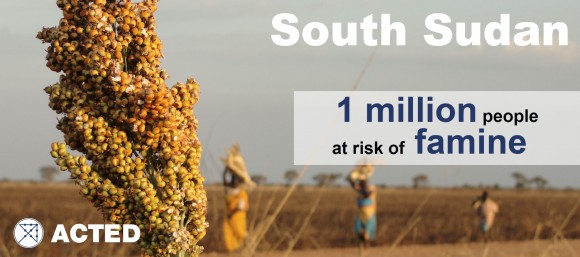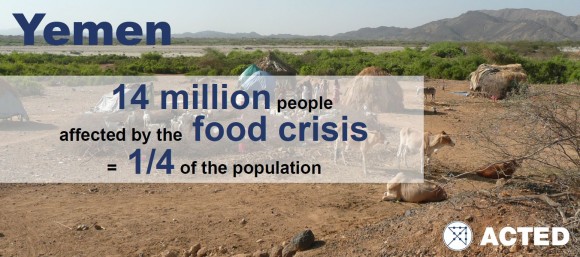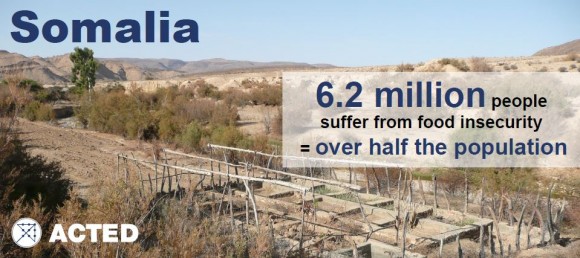The Horn of Africa and the Sahelian belt are once again affected by a food crisis, following severe droughts over the last three years, worsen by climate change and politico-security crises affecting the continent. For the first time since 2011, Africa is once again facing a famine situation.
In 2011, Somalia was undermined by famine that lead to more than 260,000 deaths. Today, Somalia has declared a state of national disaster and is moving towards the brink of a new famine. The state of famine was reported in South Sudan in early March, with more than one million people at risk, while 100,000 people are already affected. The situation is also of concern in Nigeria, Niger, Chad, Kenya and Yemen.
ACTED has been present in Africa for more than 20 years and in Yemen since 2012. The NGO is carrying out projects aimed at strengthening the resilience of the most vulnerable populations to help them cope with these difficult episodes. On the ground, in South Sudan, Somalia, the Sahel and Yemen, ACTED is one of the main humanitarian actors mobilised to provide relief to the most affected populations.
Following persistent droughts and political and security crises, the Horn of Africa and the Sahelian Belt are newly affected by a major food crisis. Famine was declared two weeks ago in South Sudan, with over 1 million people at risk. Somalia, already stricken by famine in 2011, just declared a state of national disaster. There are also concerns about the situation in Nigeria, Niger, Chad, Kenya and Yemen. Despite mobilisation to prevent these crises and to reinforce community resilience, emergency assistance is today vital to face a crisis of such a scale and support populations affected by food insecurity.
More than one million people at risk of famine in South Sudan
In South Sudan, conflict, insecurity, displacements, access problems and the effects of climate change have led to food insecurity for some 3.9 million people. In the State of Unity (in the north of the country), which is particularly fragile and vulnerable, agriculture is severely compromised due to drought and lack of access to water. Communities in the region have to walk for hours to access sources of drinking water and can only carry back the minimum for personal consumption, and cannot manage to water their crops. Today, some communities are forced to feed themselves on wild seeds and berries which are becoming increasingly rare in the absence of rainfall.

To cope with the emergency, ACTED is deploying to organise food and water distributions, while strengthening farmers’ means of production and their resilience to climate variations and related challenges.
Conflicts and food security: in Yemen, more than ¼ of the population is without access to sufficient water and food

In Yemen, the war destroyed most of the infrastructure and undermined agricultural production capacity. In a country that imports 95% of its food, the population is currently facing restrictions on wheat imports. ACTED’s on-site teams foresee possible surge in prices, with an increase of 40% and 60% in market prices in the coming weeks as Yemen is entering the lean season. 14 million Yemenis are currently considered as food insecure. Without mobilisation and solutions to ensure people’s immediate access to food, the situation could deteriorate and the pockets of famine and hunger could quickly multiply. ACTED gives priority to cash transfers to enable the poorest families to keep on eating.
Acting now to avoid another famine in Somalia
In Somalia, more than half of the population, or 6.2 million people, is at risk of food insecurity. Emergency assistance is essential today. The absence of precipitation in much of the country, decreasing incomes, rising food prices and continuous access restrictions resulting from conflict and insecurity have contributed to exhausting the coping strategies of vulnerable families. The number of people facing food insecurity has increased dramatically, and by June 2017, nearly 3 million people could be affected. Nearly 945,000 children under the age of five are suffering from acute malnutrition, including more than 185,000 from severe acute malnutrition. The crisis particularly affects the most vulnerable, including women and girls in charge of providing food and water to their families.

ACTED is currently working to support 40,000 people in meeting their basic needs in order to avoid going back into famine once again. In 2010-2011, famine in the country followed one of the worst droughts in the last 60 years, killing nearly 260,000 people. Rainfall in April-June 2017 is expected to be still below normal, with the risk of experiencing the same climatic stress as in 2011.
The food crisis in Somalia is causing significant cross-border movements, with a significant humanitarian impact on neighbouring countries, as in Kenya, where many Somalis are likely to move towards the Dadaab refugee camp and other camps scattered across the region of Garissa.
Sahel: growing concerns between insecurity and the effects of climate change

The situation is also of concern in the Sahelian countries. 1.3 million people are food insecure in Niger, including 340,000 in conflict-affected Diffa, and 4.3 million are food insecure in Chad, of which more than 1 million are considered in a state of severe food insecurity.
In North-eastern Nigeria, plunged into a potracted crisis linked in particular to Boko Haram, more than 500,000 children suffer from severe malnutrition in the Lake Chad region. ACTED is currently deploying a team in Maiduguri.